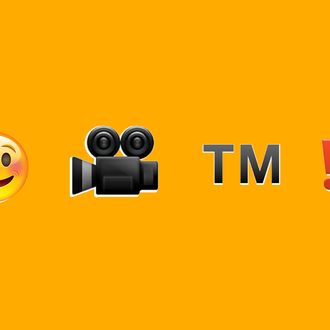
Now, I didn’t wake up this morning and think, “I’m going to break America’s heart today,” but some news demands to be told: The Hollywood Reporter Hollywood-reported today that Sony’s The Emoji Movie — a movie about … I can’t even type it — could be in hot legal water because a German former video-game executive named Marco Husges holds most of the relevant merchandise trademarks. Sony set an August 11, 2017, release date for the project, with Eric Siegel and Anthony Leondis writing and Leondis directing, but, in February, all of the trademark applications Sony put in for the film were rejected, leading to this snide (but logical) remark from Husges: “I am curious how Sony would want to produce a movie under that name and do accompanying merchandising, especially given the fact our brand has already been successfully established with license partners and retailers all over the world.”
Husges’ intentions are not to prevent the world from receiving an animated feature about the yellow faces your mom sends you by the dozen. Instead, he’d like to make his own TV, web series, and films based on the property. But the only thing hotter than the legal water is this IP, and Sony responded that they plan on proceeding full steam ahead, fully confident in their rights and their knowledge of what the upside-down face is supposed to mean.
Let’s put aside, for a second, the inherent uncanny-valley weirdness of hearing a human being say, “Inside your phone, there’s a secret world … Emoji Valley, where the industrious Emoji live and work,” which the Hollywood Reporter attributes to Sony Pictures Animation’s president at CinemaCon. Instead, it’s worth focusing on the significance of this blossoming legal battle. Anyone who’s paid even the slightest bit of attention to the movie industry over the last few years has noticed that fewer and fewer original films — i.e., projects conceived and created expressly for the screen — are being made. We’ve crossed the Rubicon; studios know it’s easier, faster, and safer to take something people already like and turn it into a movie.
But as we’ve gotten deeper into the grip of adaptation fever, those source properties are getting weirder and weirder — instead of narrative material, à la TV shows, books, and video games, studios began tapping nonnarrative sources. There was The Lego Movie, which, thanks to the ingenuity of Phil Lord and Chris Miller, improbably turned out to be good; then there was The Angry Birds Movie, which opened atop the box office two weekends ago. And this evolution ignores the ideas that didn’t work out, like Peter Berg’s costly flop Battleship, since there are enough successful examples now that the unsuccessful ones are falling by the wayside.
Hence our current situation: The Emoji Movie is looming, as are Lego and Hasbro cinematic universes and even, supposedly, a film based on Tetris. All of these properties are based on intellectual property, or IP, one of the major buzzwords of the current entertainment industry; the phrase “hot IP,” which I deployed earlier, is the kind of thing that studio execs use in earnest and post-ironic writers like me use post-ironically. In the past, hot IP has generally been major book releases, like the Harry Potter franchise, or other, similarly entertainment-industry-located properties.
But with studios now stepping outside the domain of other major corporations’ products and into the the crowd-created and often blurry netherworld of apps, the situation isn’t so simple. Often the work of individuals or smaller companies, the IP of apps and Internet-based concepts isn’t usually created with the manpower of a department of copyright lawyers behind it; that doesn’t mean there aren’t trademarks or patents, but it does suggest that they are far less well-defended than those of big companies.
What we see when we look at Marco Husges and Sony fighting over that sweet, sweet emoji guap is something representative of the Wild West of crowd-created digital marketplaces and web-based dissemination. We’re seemingly entering a new world of increasingly murky IP, with massive studios trying to strong-arm smaller trademark holders; obscure trademark holders roadblocking massive studios; or, likely, some combination of the two. Regardless of what happens with The Emoji Movie, there will be no shortage of angry faces, emoticons and otherwise, in Hollywood’s future.




